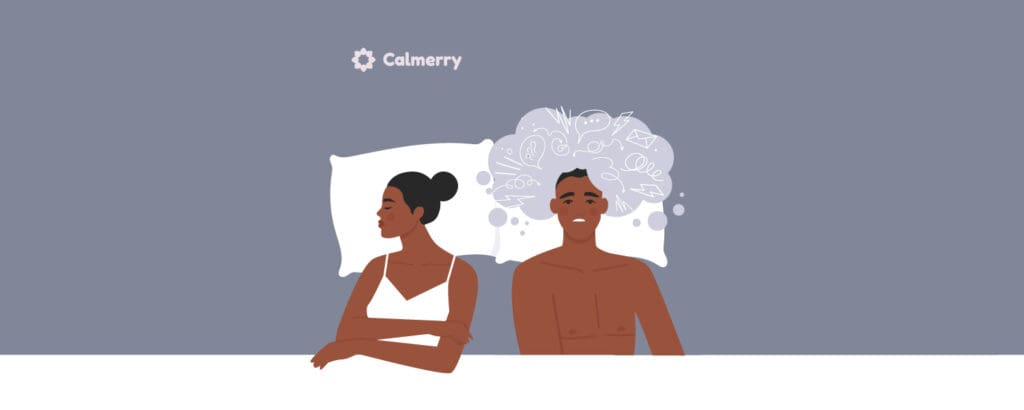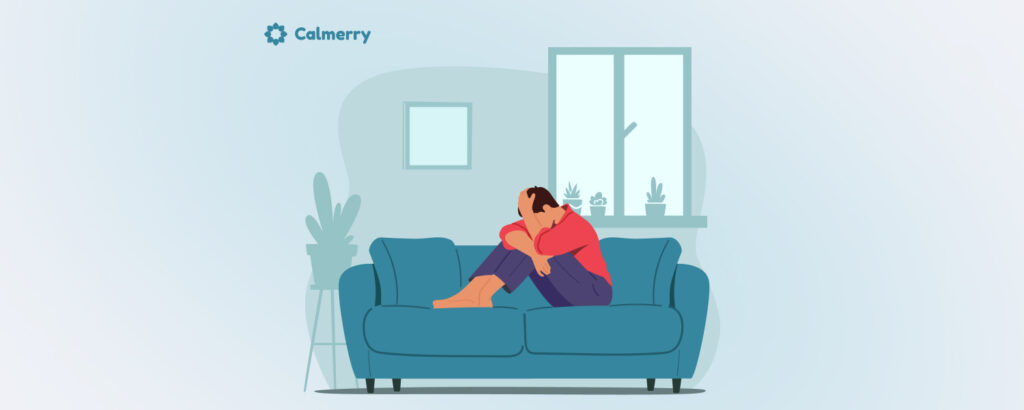9 Health Effects of Anger in Men (And What to Do About It)

In this article
All of us feel angry from time to time. Anger is a completely natural emotion, just like joy or fear, and it’s impossible to imagine our lives without it. Psychologist Paul Eckman recognized 6 basic emotions, and anger is one of them.
Sometimes, anger can even be helpful, enabling a person to reflect on difficult situations and understand what they need to change. However, anger can also be destructive. Not only can it negatively affect your relationships with others, but it can also damage your mental and physical health.
There is a difference between feeling angry and having anger issues. There’s nothing wrong with experiencing anger per se, but it’s the way we manage the anger that really matters.
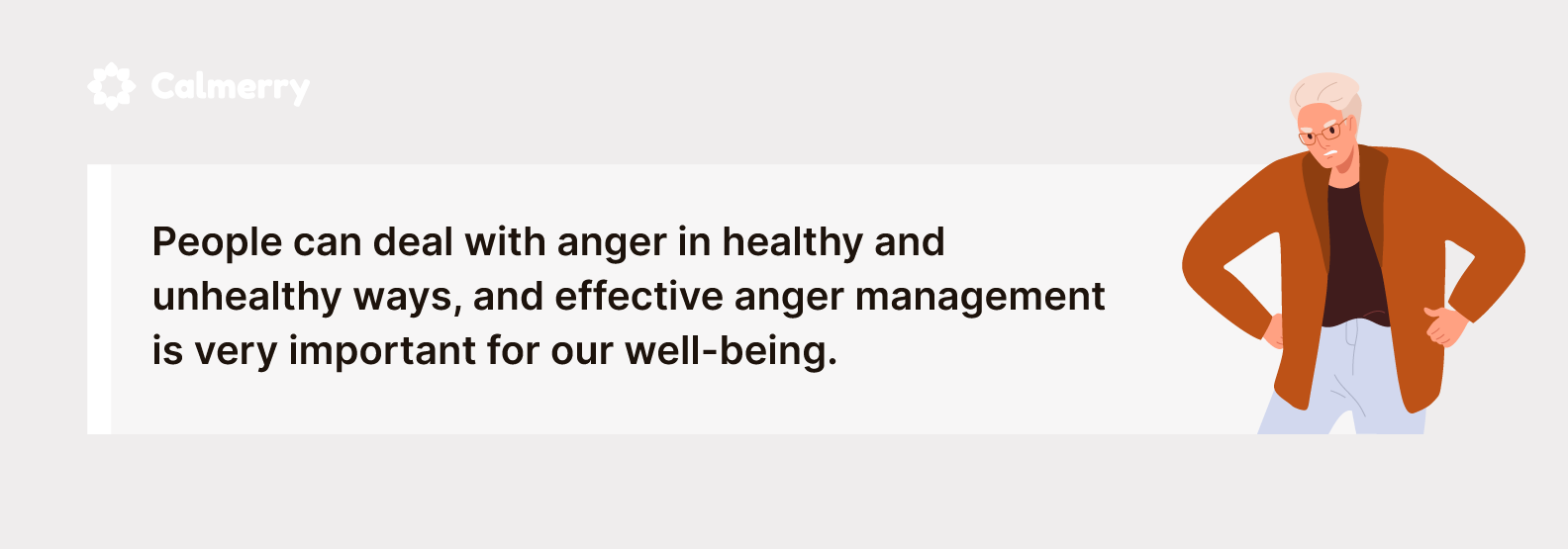
Do you keep wondering, “Why do I get angry so easily?” This article might shed light on common problems associated with this response and help you find some answers. We’ll take a closer look at the way anger affects men and the symptoms associated with this issue.
What you should know about anger in men
Although people of any gender experience anger, there are many factors that can make male anger more destructive and translate this emotion into aggression.
Many men see anger as something unwanted, uncomfortable, or even scary, while some men experience anger regularly and don’t even view it as a problem. Some may even perceive their anger as an integral part of their personality.
One of the things you should know about anger is that this emotion is a healthy response that can be appropriate in many situations. And if that’s the case, there’s no point in denying, suppressing, or masking anger. Quite the contrary, a more productive way is to express your anger healthily while making sure that you’re staying in control of your emotions. This prevents the anger from affecting your well-being and clouding your thinking.
For example, you can control anger outbursts by practicing deep breathing, writing out how you feel, visualizing something positive, utilizing diversions, or asserting yourself in an appropriate, non-aggressive way.
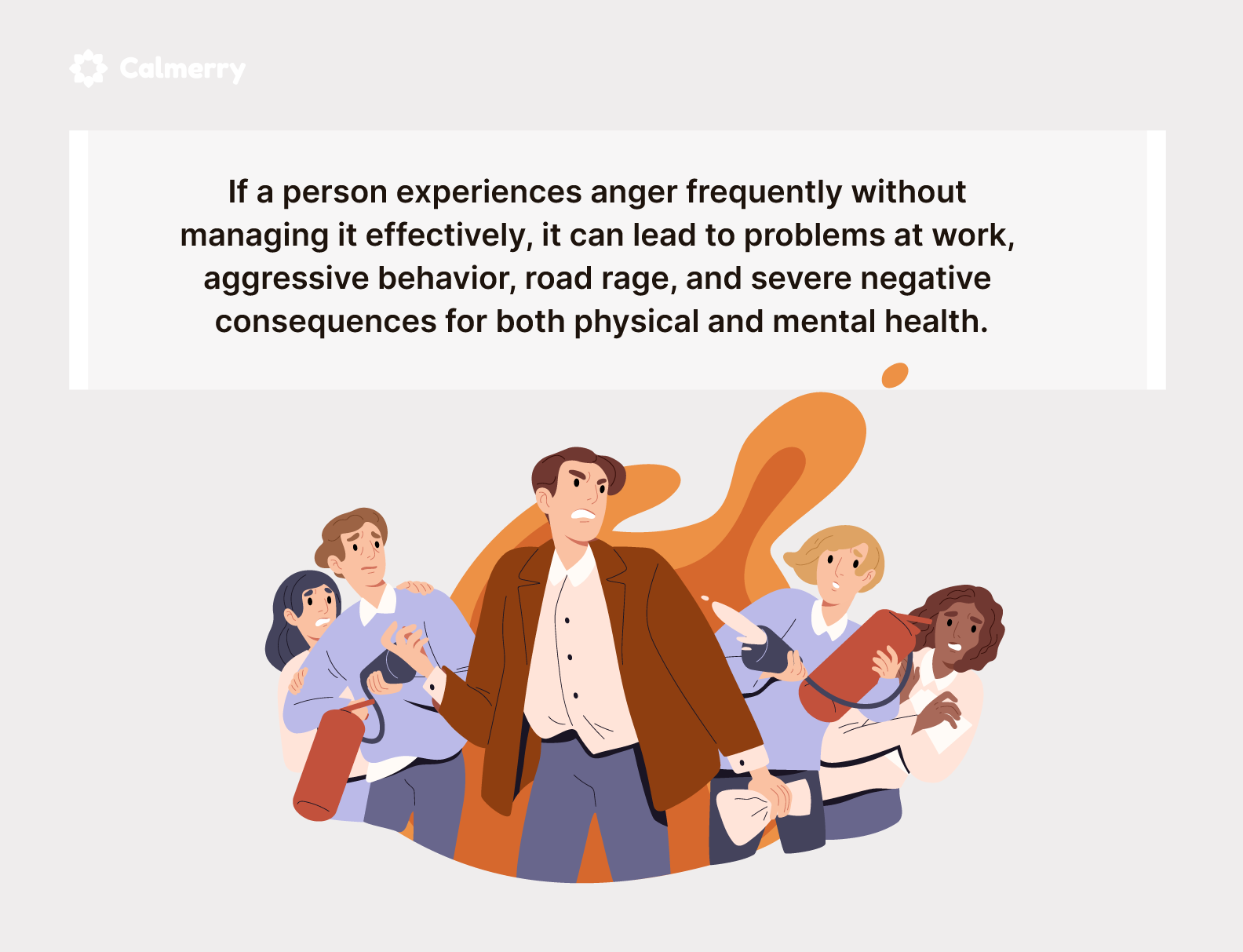
According to research, men are more likely to have anger issues, and most men who struggle with anger management demonstrate decreased psychosocial functioning.
The way men deal with anger largely depends on societal expectations.
One of the main reasons why it might be more difficult for men to cope with anger is that there are many unhelpful societal expectations that stem from traditional gender stereotypes. The traditional concept of masculinity revolves around strength, control, and dominance.
Although such traits might even play a positive role on rare occasions, people with a stereotypically masculine attitude may face various negative consequences for their mental health.
Besides, another traditionally masculine trait – stoicism – makes men less likely to address their mental health and emotional needs and more likely to deny that they have any problems.
Anger as an unhealthy coping mechanism
Anger issues are particularly common among men who experienced trauma as children or in their adult lives. Other common risk factors are poor interpersonal skills and substance use disorders. Besides these risk factors, men often use anger as a defense mechanism in an attempt to hide their vulnerability.
Anger can be caused by various factors, including frustration and fear. Quite often, anger plays the role of a secondary emotion that follows another emotion. Sometimes, reflecting on your feelings can be uncomfortable, and in this case, people often prefer to focus on anger rather than its underlying causes.
The inability to acknowledge personal insecurities and vulnerabilities is one of the common signs a man has anger issues.
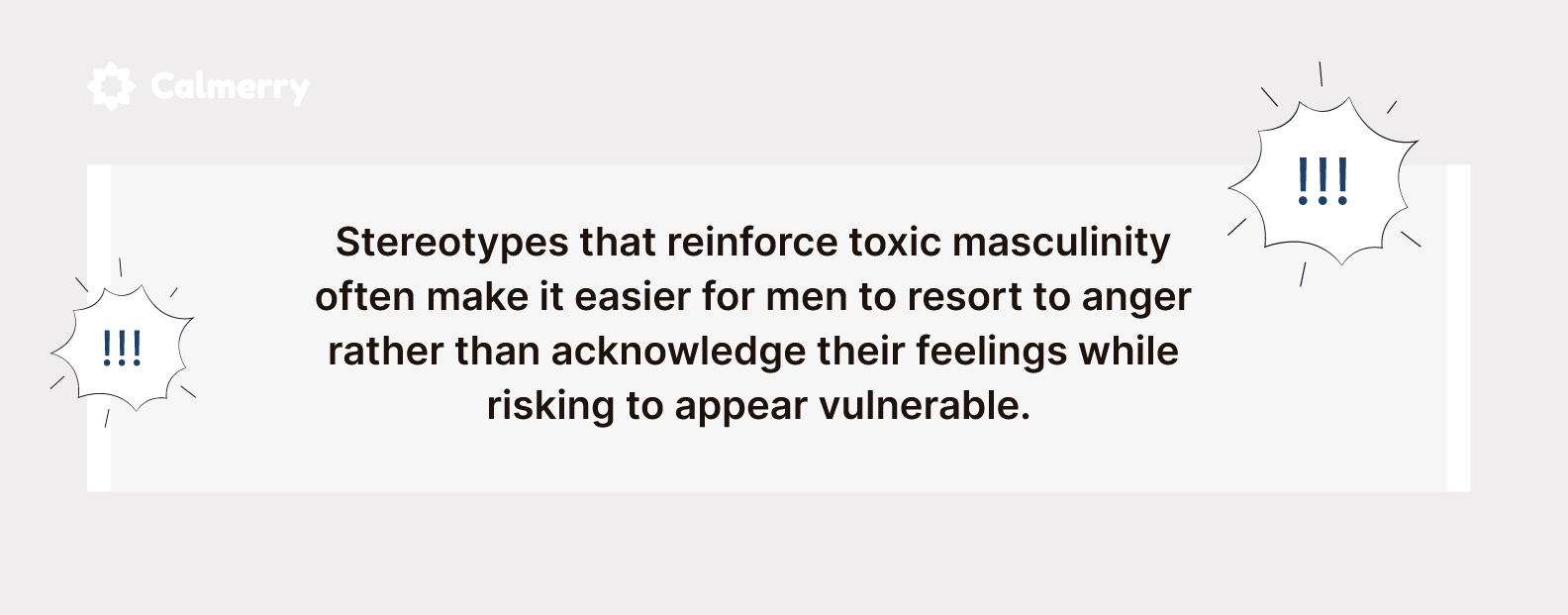
Here are the most common issues that men hide behind anger:
Shame and guilt
People experience guilt when they believe that they’ve done something bad. Shame is a similar feeling, but it focuses not only on the wrongdoings but also on who we are as a person. In other words, someone may feel ashamed when they believe that they are a bad person.
Many men are afraid to acknowledge their shame, and recognizing it can even make this feeling stronger. As a result, men often act aggressively when they feel humiliated, shamed, disrespected, or ridiculed.
Fear
While fear is one of the basic emotions that all of us experience every once in a while, the relationship between fear and traditional gender stereotypes is quite problematic. Fear in men is often perceived as a weakness, and societal expectations reinforce the image of a brave man who responds to threats with actions.
As a result, men often tend to deny their fear and learn to suppress this feeling. At some point, fear can become so overwhelming that it may come out as anger.
Jealousy and envy
Both envy and jealousy can lead to a feeling of inadequacy. When you think that someone wants to take something from you or desperately wants to have something other people have, you may eventually start to feel like there’s something wrong with you. Such a feeling can easily turn into shame, which in turn might cause anger.
Sadness
Sadness can make you feel vulnerable. When men are expected to be strong, sadness can be seen as a sign of weakness, so anger eventually becomes a more desirable option.
Loneliness
The feeling of loneliness can have a significant negative impact on one’s self-esteem. It can trigger various negative thoughts, and emotions may become extremely volatile and difficult to control.
For instance, a person may start to feel angry at others, blaming them for this feeling. An inability to recognize the root cause of one’s own problems is one of the common anger issues symptoms.
So, what does anger do to a man?
Anger can not only negatively affect your social life but also have a significant negative impact on your health. When talking about the mental and physical effects of anger, it’s important to mention the connection between anger and stress.

Anger triggers the so-called fight-or-flight response. When you’re stressed out, your body starts to produce stress hormones, including cortisol and adrenaline, which impact different organs and systems in your body. For example, these hormones can cause muscle tension and increase heart rate. An increase in these stress hormones in the body can cause and worsen many different health issues.
Here are some of the key mental and physical effects of anger:
Depression
Numerous studies show a connection between depression and anger. Most often, people diagnosed with depression ruminate on things that make them feel angry and demonstrate some signs of passive-aggressive behavior.
As we’ve already mentioned above, men often can’t or don’t want to admit that they have mental health problems. As a result, many men with depression resort to unhealthy coping mechanisms, including drugs and alcohol.
Given that anger is one of the common emotional effects of alcohol, such unhelpful coping strategies may only worsen depression and anger issues.
Heart problems
Anger outbursts increase the chance of having a heart attack, and even repressed anger can also damage your cardiovascular system. According to research, people who have anger among their dominant personality traits are twice more likely to develop the coronary disease than people who stay calmer more often.
Increased anxiety
Anger is also linked to anxiety. Research data demonstrates that hostility and anger can worsen the symptoms of generalized anxiety disorder, and people diagnosed with it feel angry more often.
Given that anxiety is characterized by uncontrollable worries, people with this disorder also often experience internalized anger.
Weak immune system
When you’re stressed out, the processes in your body that can help you fight or escape a threat get a higher priority. This, however, is done at the expense of other processes. As a result, stress can negatively affect your memory, immune system, and your body’s ability to heal.
Furthermore, research data shows that even recalling negative experiences that make you feel angry can decrease the level of the immunoglobulin A antibodies for six hours. As you can see, it takes a lot of time for your body to recover from stress and anger.
Sleep disorders
Constant exposure to stress hormones caused by anger can impact your sleeping habits. This is due to the fact that the stress response and sleep use the same neural and hormonal pathways in your body. The HPA axis is involved in the stress response, and it also regulates your circadian rhythm by keeping you awake during the day.
High levels of cortisol can overstimulate the HPA axis, keeping it active for longer periods of time and therefore disrupting your sleep cycle. As a result, chronic stress caused by frequent anger often leads to insomnia and other sleep disorders.
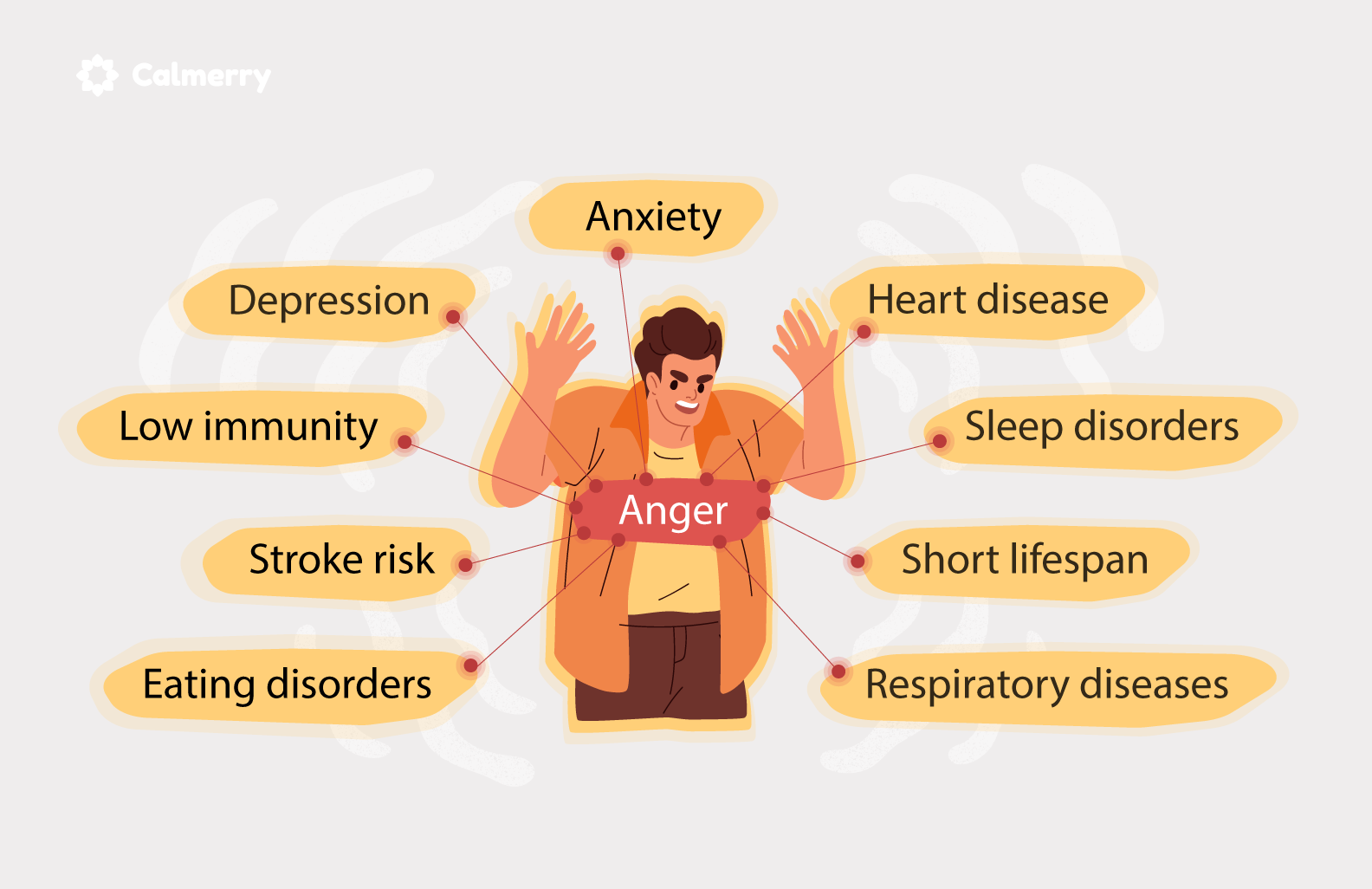
Higher stroke risk
If you tend to blow a fuse a bit too often, you should also be aware of the higher stroke risk. Studies show that the risk of having a stroke increases threefold within two hours after anger outbursts. Anger is also associated with a higher risk of an aneurysm rupture.
Impaired lung function
A Harvard study that involved 670 men showed that participants who scored more on a hostility scale had significantly worse lung capacity and, therefore, a higher risk of respiratory diseases. Such an impact of anger on lung function was also attributed to stress hormones.
Eating disorders
Researchers also link anger to eating disorders. It turns out that people with anorexia, bulimia, and other eating disorders tend to experience anger particularly frequently and also have higher levels of anger suppression.
Bulimic behavior often develops as a response to suppressed anger because it can be used as an unhealthy coping mechanism to avoid angry outbursts.
A shorter lifespan
Even if you don’t express your anger openly, you may still experience the effects of anger on mental health, along with its destructive impact on physical health.
A study by the University of Michigan that focused on 192 couples observed within 17 years showed that people who suppressed their anger had a shorter lifespan.
What can you do about it?
As you can see, there are many reasons why you can benefit from learning how to deal with anger in a healthy way. This way, you can avoid unnecessary stress and minimize the negative impact of this emotion on your mental and physical well-being.
Many men struggle with anger issues, and overcoming them often turns out to be a challenge. So you shouldn’t hesitate to seek professional help if you need it. A licensed therapist can help you figure out the root causes of your anger issues and suggest effective coping strategies.
Acknowledging your flaws and vulnerabilities doesn’t make you weak. Quite the opposite, it takes a lot of courage and inner strength to admit that you help to cope with a problem. Making the first step toward a more balanced life can be difficult, but you will never regret such a decision.
online therapy
live video session


